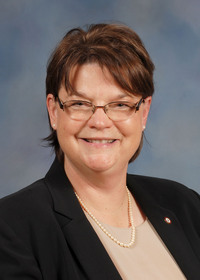Information Possibly Outdated
The information presented on this page was originally released on December 8, 1997. It may not be outdated, but please search our site for more current information. If you plan to quote or reference this information in a publication, please check with the Extension specialist or author before proceeding.
Alcohol, Holidays Do Not Mix Well
By Amy Woolfolk
MISSISSIPPI STATE -- Mississippians will have many opportunities to celebrate during the holidays, but take extreme caution when alcohol is served.
Nutrition guidelines set by the U.S. Department of Agriculture do not recommend the consumption of alcohol. For those who intend to drink anyway, USDA recommends only moderate drinking.
Dr. Barbara McLaurin, extension human nutrition specialist at Mississippi State University, said USDA's definition of moderate drinking is different for men and women.
"Drinking in moderation for a women is having no more than one drink daily," McLaurin said. "For men, the definition is no more than two drinks a day."
One drink is either 12 ounces of beer, 5 ounces of wine, 1.5 ounces of rum, gin or whiskey, or one mixed drink.
McLaurin cautioned against drinking on an empty stomach. An empty stomach intensifies the effects of alcohol on the body. Foods high in protein, such as meats and cheeses, can be helpful in lessening alcohol's effects.
"Drinking on an empty stomach allows alcohol to effect the body much faster," McLaurin said. "Alcohol can work as an appetite suppressant, so for nutritional reasons, it becomes even more important to eat before or while drinking."
Because alcohol is high in calories and low in nutritional value, the specialist said it can be fattening. It can even be dangerous to a person's nutrition when consumed in great amounts. People who substitute alcohol for food are putting their nutritional health in jeopardy.
McLaurin said there are several groups of people who should not drink any amount of alcohol. Women who are pregnant or trying to conceive should avoid drinking. Adults on certain types of medications also should not drink. The medicine may react in a negative way with the alcohol.
Those who cannot drink in moderation or have to drive should not drink. Children and adolescents should never drink alcohol.
McLaurin urged party-goers who do not want to drink to look for non-alcoholic alternatives. She recommended mixed drinks without alcohol, fruit juice, soft drinks or water.
The specialist offered advice to party hosts to help ensure the safety of guests. Offer non-alcoholic beverages throughout the party, and offer only non-alcoholic beverages near the end. This will help make sure your guests get home safely.
Watch for guests who cannot drink in moderation and be prepared to get them home if necessary. Keep lots of food and snacks on hand to keep guests from drinking on an empty stomach.
"It cannot be stressed enough how important it is to avoid drinking on an empty stomach," McLaurin said. "Everyone should be aware that drinking and driving is extremely dangerous."






